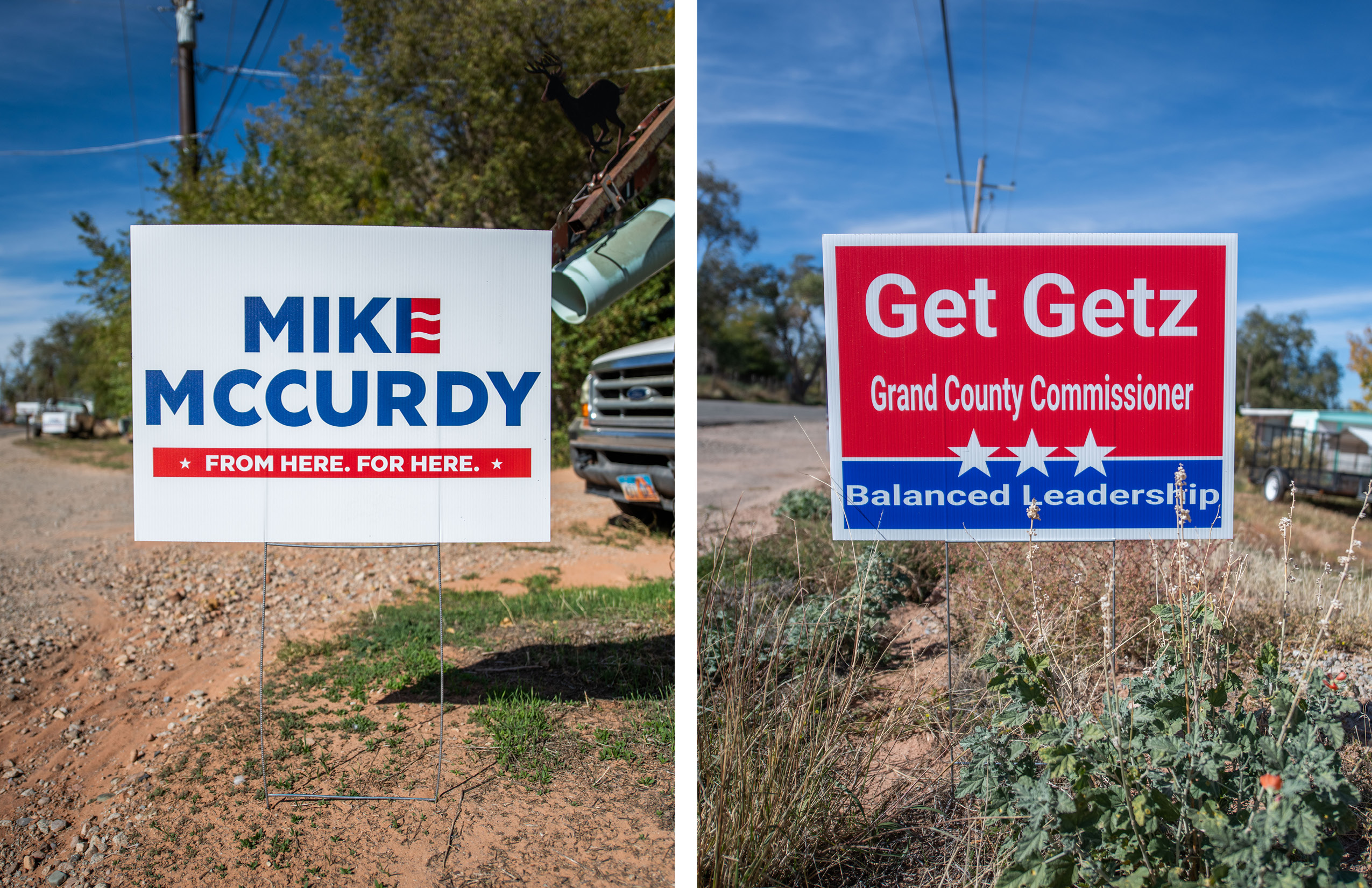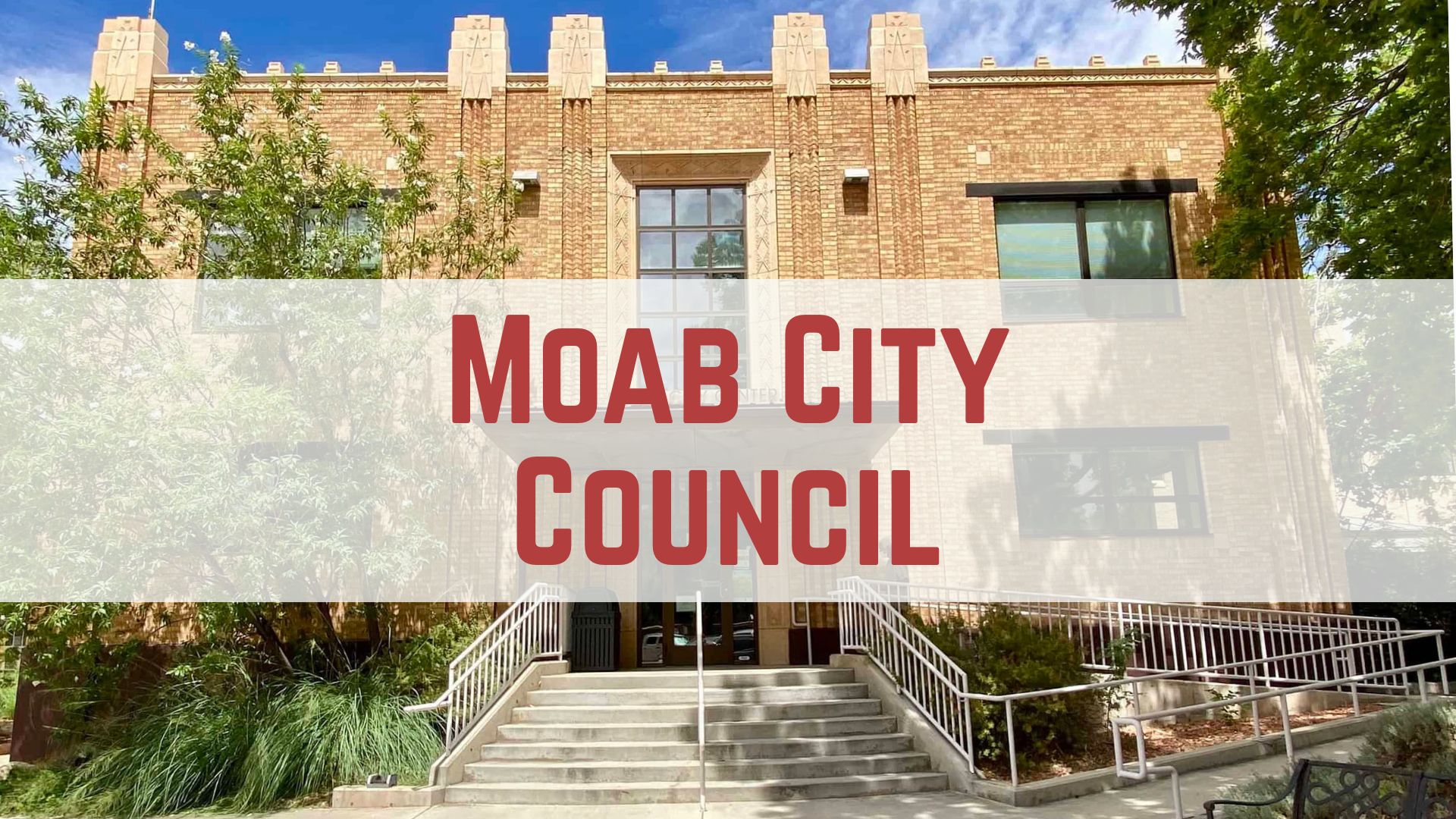Some information may be outdated.
November 8 is Election Day, but your mail-in ballot should be arriving soon—why wait to learn more about this year’s candidates?
This week, we spoke to candidates for the three Grand County Commission seats up for election this year: Emily Campbell and Bill Winfield running for Commission At-large, Lori McFarland and Mary McGann running for District 4, and Steve Getz and Mike McCurdy running for District 5.
Voting Information
Grand County conducts elections through mail-in ballots, so you and all our local voters can take the time to get informed on the candidates before making your choice. Voters can mail back the ballot postmarked no later than November 7 or drop it off at the Grand County Clerk’s office within the County Administration office (125 E. Center Street, Moab) by 8 p.m. on Election Day, November 8.
Ballots were sent around October 18. If you are a registered voter and have not received your ballot, call 435-259-1321.
The last day to register to vote and receive a ballot by mail is October 28. There will be an in-person voting period from November 2 to 7 from 9 a.m. to 4 p.m. at the Clerk’s office. The office will also be open for in-person voting on Election Day from 7 a.m. to 8 p.m.
Curious about ballot security? Read the Grand County Clerk’s office election policy and procedures at www.grandcountyutah.net/904/Vote-by-Mail.
Click the map to make it larger!


Mike McCurdy
What’s your history in Grand County? What sort of work have you done professionally? What made you decide to get involved with local government?
I was born and raised in Grand County, along with my wife, Ronnie McCurdy, and our 5 children. Growing up and raising our children here has been our life’s focus as we see this as our HOME. Most of you know me from managing City Market, but now I’d like you to know me for serving my community to ensure this remains a great place for all of our children to grow and prosper. For that to happen, we need to address the concerns of our citizens to shift political focus on basic shelter needs, realistic water use, and a balanced economy with an accessible government. Our community needs helpful, long-term, and clear policies NOW.
What’s an example of a great ordinance or political move you’ve seen in the last few years here in Grand County? What is one you believe was a misstep?
As a father in this community, it was wonderful to see our children being priorities again with the return of a school resource officer. Our children are the most vulnerable and we as parents trust our school districts to keep them safe. Seeing our local government reinstate this role has been relieving.
A misstep I see is also an opportunity as we move forward, some of our citizens do not feel represented in critical political discussions, and residents are finding it overly cumbersome to find information on frequently asked questions on these issues. This is a great opportunity for a review and update on providing this information with a focus on accessibility.
What is your strategy to evaluate whether a proposal or ordinance is worth implementing?
My priority is to get Grand County’s long legacy of people of different political opinions working together.
Most people are willing to compromise to resolve the issues we face in a manner that benefits all of us. Often, we find this willingness to compromise missing in the political process, which can become detrimental to the process, and it is our citizens who suffer. My strategy is simple; to bring the voice of the people back to our County Commission. Focusing on a collaborative approach between those with the subject matter expertise and those who would be most affected by the choices made, in an open and timely manner is how we gain a path forward for all of us. This is my first and foremost priority.
What three steps would you take in the next year to put our county on a firm footing for the future?
It is important to foster open communications to ensure the public feels their voices are part of the political decisions that impact this community. Responsibly managing our water supplies with realistic and accurate data for current and future use. Removing blocks to our building process to allow those builders who are ready and willing to build affordable housing NOW is critical to alleviating our outrageous housing crisis. I care deeply for my community, my home, and will do all I can to protect our collaborative legacy to work together on solutions that provide a future that includes our children as well as ourselves. I’m from here, for here.

Steve Getz
What’s your history in Grand County? What sort of work have you done professionally? What made you decide to get involved with local government?
I’ve owned a variety of different businesses; air quality testing, environmental lab, boat storage, and gift shop. Three were successful; one failed. Many lessons were learned from success and from failure. The skills to be successful in business are the skills a commissioner needs: long-term vision, listening skills to understand a wide variety of people, the ability to formulate and then communicate new ideas/solutions, and the ability to build consensus with diverse groups. Terri and I retired here, drawn by the small town and Terri’s family connections.
Water is the issue that got me off the couch and made me decide to run. My family has been involved in water management for several generations. I hope my history and knowledge about water can help our valley save a lot of wondering, worrying, and uncertainty.
What’s an example of a great ordinance or political move you’ve seen in the last few years here in Grand County? What is one you believe was a misstep?
The best: the effort the county has made to clean up the uranium mill tailings. The amount of effort by the commission (council) and lobbying to speed up the removal process is commendable. To have the project completed decades sooner…Good job!
A misstep? Not recognizing the looming housing issue. It’s not just Grand County, many communities are facing the same problem. As we work on the issue, it would be prudent to watch other communities’ ideas, and see what works for them.
What is your strategy to evaluate whether a proposal or ordinance is worth implementing?
I would use KISS: keep it simple. If there is an issue that needs to be solved, was the issue carefully defined? Does the ordinance solve the issue without adding unrelated requirements? Is the ordinance easy to understand, comply with, and enforce? Were the people that will deal with the new ordinance consulted? Include the county staff, the public using the ordinance, and code enforcement staff or police. Does the new ordinance cause new problems?
What three steps would you take in the next year to put our county on a firm footing for the future?
Short-term: Let’s get the affordable housing issue settled. What type of housing is needed? River guides that need a camping spot and a place to park a car? Seasonal workers here all season? Year-round, full-time workers? Each group needs different housing. How many of each housing type do we need? How much is already in the planning/building pipeline now?
Long-term: Water. Time for talk is over, it is time to act. First, I would help the community recognize that we live in a “valley-wide water system.” Mother Nature doesn’t care about all the political lines we have drawn throughout the valley. In order to manage our water, the entire valley needs to work together, as one, with cohesive, comprehensive goals.
Monitoring and data collection. Our aquifers are like a checking account. Mother Nature deposits water, we make withdrawals. We need to “check the balance” with a well-designed monitoring system. Consistent, accurate, and timely accounting is critical for good water management. If we plan early and with a well-designed system, we can include water for all our residents and Mother Nature.
Appreciate the coverage? Help keep local news alive.
Chip in to support the Moab Sun News.





